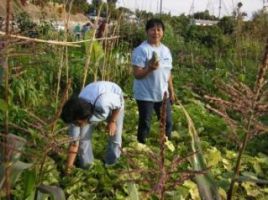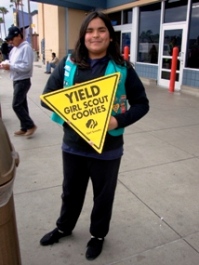Research and Writing Projects
Building Healthier Communities and Pathways to Higher Education with Native American Youth
This project is funded by a grant from the HDR Foundation and coordinated by ISYS Fellow Dr. Denise Goerisch. The project follows up on the ISYS Center’s collaboration with the SDSU American Indian Studies Department and the American Indian Recruitment (AIR) program during the summer of 2013. AIR has been running programs to encourage and prepare Native American students to pursue higher education for a number of years at SDSU. ISYS researchers connected with AIR because we feel geography and related courses of study are inherently relevant to students who are interested in understanding and addressing issues of importance to native communities. We think exposing native students to geography can help motivate them to pursue higher education while possibly also creating new undergraduate majors for our department. This year-long mentoring program gives us a chance to work intensively with 9 community college students to help them to be successful in higher education while also exploring options for continuing their education at a 4-year college or through career training. Project Objectives: 1. To provide academic coaching to Native community college students to help them to be successful in college and explore next steps. 2. To mentor students in conducting an investigative research project on a topic affecting Native American communities or youth, preferably with an explicit geographic component. 3. To assist youth in making contact with community leaders and professionals to collect more information about their topic, how it is currently being addressed, and ideas about how they might educate themselves to be an asset in addressing the issue in the future. 4. To build and deepen relationships between ISYS and the larger SDSU community and the Native American communities of the San Diego region. Contact Lydia Wood for more information.
Preserve Little Italy - a collaboration with the San Diego Little Italy Association
In 2010 ISYS began a collaboration with San Diego’s Little Italy Association (LIA) to research and document the rich history and geographies of San Diego’s Little Italy neighborhood. A $40,000 grant was secured from the National Park Service through the Preserve America program, with matching funds committed by LIA and the office of County Supervisor Ron Roberts. The long-range goal of this project is to increase opportunities for heritage tourism in Little Italy, with research and documentation representing the first step in this direction. The project is also exciting because it is providing SDSU and local K-12 students with project-based learning experiences and opportunities to engage with the diversity of local neighborhoods and communities. Click here for a more complete description of this project or contact Dr. Thomas Herman for more information.
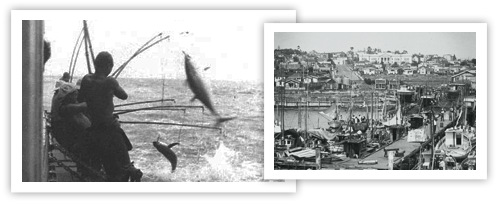
The Right to the (Healthy) City: Public Parks, Community Formation and the Politics of Place
The principal goals of this project are to understand how and why people use public parks, and how these spaces become negotiated parts of communities. There is mounting evidence that greater access to parks leads to better physical, mental, and social health and well-being. As a result, policy-makers have advocated the development and restoration of urban parks, particularly in largely neglected poor and low-income areas. The underlying assumption is that if park space and facilities are available, people will become healthier. However, we know little about how different local residents – particularly children and youth— perceive, use, and connect with neighborhood parks. This project addresses this knowledge gap by focusing on three urban neighborhood parks in San Diego. It investigates who uses parks and the political and social negotiations involved in their production as “community” spaces. We particularly interested in the processes of inclusion and exclusion from public space, the tensions between parents and children regarding acceptable and desirable activities, and the role of local voluntary organizations in shaping access to and use of public land. The project explores of the relational and emotional qualities of public spaces, community formation and citizenship. Contact Dr. Pascale Joassart-Marcelli for more information about this project.
City Heights Community Food Security Assessment Project
The project focuses on City Heights, one of the poorest, youngest, and most ethnically diverse communities of San Diego, located just a few miles from SDSU, and investigates the role of place in influencing food choices among young people. It pays particular attention to the food environment, including retailers, restaurants, and alternative sources of food, and to community gardens, which have been heralded as alternative spaces of production and sources of fresh healthy food in food-insecure neighborhoods across the nation. While addressing research questions in urban, cultural and health geography regarding the relationships between place, food practices and health outcomes, this project provides hands-on learning experiences for undergraduate and graduate students and builds partnerships with local community-based organizations, such as the International Rescue Committee which are leading several new initiatives designed to reduce disproportionately high rates of childhood obesity through environmental strategies. Several students are currently working with staff and faculty to conduct audits of food vendors and map parcels available for community garden development. Contact Dr. Pascale Joassart-Marcelli for more information about this project. Photos below are of the City Heights Farmer's Market (source: Voice of San Diego) and the New Roots Community Garden (source: The Epoch Times).
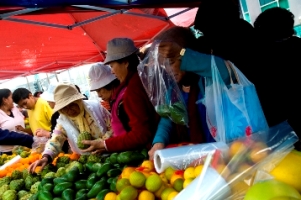
Electronic Pen Pal Exchange: Orange County YMCA and Tio Lino’s Mundo de Arte (Rocinha, Rio de Janeiro, Brazil)
In this service-oriented project, PhD student Ryan Goode is working with others to facilitate a cultural exchange between the YMCA of Orange County’s after school program and a non-profit art school for children in the favela (squatter settlement) of Rocinha, Rio de Janeiro. Students at both schools will explore their respective spaces of family life, community, and recreation through a series of photo-journalism projects using digital cameras. These digital narratives will then be uploaded to a commonly accessed blog where students at each school can explore the differences and similarities between life in Orange County and Rio de Janeiro. The electronic pen pal exchange is part of a broader service learning project the Orange County YMCA is conducting on favelas in conjunction with Favela Puzzles (www.favelapuzzles.com), a charity-based organization attempting to repair the badly damaged roof at Tio Lino’s Mundo de Arte in Rocinha. Contact Ryan Goode for more information about this project. The image below is one of the Favela Puzzles (Largo do Boiadeiro) created to generate support for a youth program in Rocinha, Rio de Janeiro, Brazil.
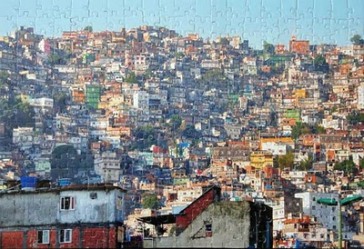
Smart Cookies: Gendered Spaces of Capitalism in the Girl Scout Cookie Sales
Each year thousands of Girl Scouts sell cookies to friends, family and neighbors to raise money for their troops and local councils. Lauded as the largest girl-led financial literacy program, the annual Girl Scout cookie sale not only teaches girls essential business and leadership skills but also prepares them for their roles as women in a capitalist society. In addition to teaching scouts capitalist practices of enterprise, the Girl Scout organization stresses the importance of community citizenship. In order to become engaged citizens, local councils encourage troops to use their cookie money to fund both local and international service projects, thus creating new and dynamic spaces of giving. Based on observations and interviews collected in San Diego, PhD student Denise Dixon Goerisch investigates the spatial intersections between gender, capitalism and citizenship interwoven throughout the sales. Please contact Denise Dixon Goerisch for more information.
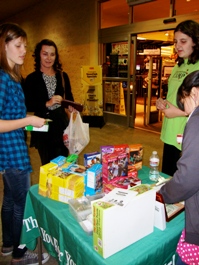
Integrating Space and Place into Children’s Perceptions of Environmental Health Hazards in Accra, Ghana
PhD student Marta Jankowska's dissertation research integrates environmental health, health geography, spatial cognition, and children's studies to try to understand how children in Accra perceive and interact with daily environmental threats to their health. Her blog, which eventually will have information concerning the study, can be found at www.geographyofthings.com. The pictures below are from one of the focus groups Marta conducted with girls in Accra from some previous work, asking them to map their neighborhood. Please contact Marta Jankowska for more information.
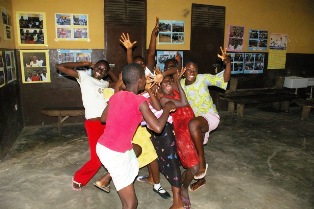
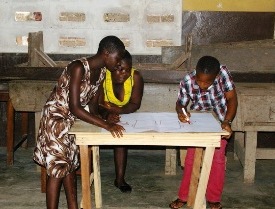
Young People as Agents of Change: The Experiences of New Immigrant Families in a Border Community
This project examined how children and young people act as agents of change with regard to the community involvement and civic participation of new immigrant families in a suburb of San Diego, California. The goals of the project were to uncover different pathways and strategies that immigrant adults develop and follow as a result of their interaction with children and young people in their communities. By analyzing how young people exert a continual and subtle influence on the knowledge and perspectives of immigrant adult family members, this project advances knowledge of the way immigrant families overcome barriers to assimilation and become involved in their communities. This project contributes to current scholarly and policy debates regarding the civic and community incorporation of immigrants in the contemporary United States. "Women and Children in a Neighborhood Advocacy Group: Engaging Community and Refashioning Citizenship at the United States-Mexico Border" (by F. Bosco, S. Aitken, and T. Herman) is due to come out in 2011 in Gender, Place and Culture 18(12). For more information about this research project, please contact Dr. Stuart Aitken and/or Dr. Fernando Bosco.
The Awkward Spaces of Fathering
Social science research often defines a father’s relationship and involvement with his children as a form of co-parenting that is interdependent with, in opposition to, and at times less than mothering. It is a position that tends to avoid issues of power, dominance and positioning, and often soft-pedals the emotional bonds between fathers and their children. This project seeks to advance knowledge of the mythic ideals that help structure the gender and spatial relations of fathering, and to understand more fully how these get in the way of the day-to-day work of fathering. Click here for a more complete description of this project or contact Dr. Stuart Aitken.
Global Childhoods: Globalization, Development and Young People
This volume is edited by Stuart Aitken and includes a contribution by Fernando Bosco. This collection highlights one important frame for understanding the importance of children’s geographies: the social construction of children and the spatial dynamics of local childhoods are related to global and political economic trends and conceptualizations of development. Click here for a complete table of contents or contact Dr. Stuart Aitken.


